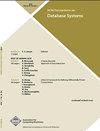本体数据库查询改写与优化
IF 2.2
2区 计算机科学
Q3 COMPUTER SCIENCE, INFORMATION SYSTEMS
引用次数: 96
摘要
本体查询是根据由扩展数据库和本体(即,一组逻辑断言和约束,从扩展数据库派生新的内涵知识)组成的知识库进行评估的,而不是直接在扩展数据库上进行评估。这类查询的评估和优化是数据库研究中一个有趣的新问题。在本文中,我们将讨论这个问题的两个重要方面:查询重写和查询优化。查询重写包括将本体查询编译为针对底层扩展数据库的等效一阶查询。我们提出了一种新的查询重写算法,用于相当一般类型的本体论约束,非常适合于实际实现。特别是,我们展示了如何使用线性和粘性存在规则(即最近引入的Datalog±本体语言家族的成员)表示针对知识库的连接查询,可以编译成针对底层数据库的连接查询联合(UCQ)。在这种情况下,本体论查询优化试图改进这种重写过程,以便为输入查询生成可能较小且经济有效的UCQ重写。本文章由计算机程序翻译,如有差异,请以英文原文为准。
Query Rewriting and Optimization for Ontological Databases
Ontological queries are evaluated against a knowledge base consisting of an extensional database and an ontology (i.e., a set of logical assertions and constraints that derive new intensional knowledge from the extensional database), rather than directly on the extensional database. The evaluation and optimization of such queries is an intriguing new problem for database research. In this article, we discuss two important aspects of this problem: query rewriting and query optimization. Query rewriting consists of the compilation of an ontological query into an equivalent first-order query against the underlying extensional database. We present a novel query rewriting algorithm for rather general types of ontological constraints that is well suited for practical implementations. In particular, we show how a conjunctive query against a knowledge base, expressed using linear and sticky existential rules, that is, members of the recently introduced Datalog± family of ontology languages, can be compiled into a union of conjunctive queries (UCQ) against the underlying database. Ontological query optimization, in this context, attempts to improve this rewriting process soas to produce possibly small and cost-effective UCQ rewritings for an input query.
求助全文
通过发布文献求助,成功后即可免费获取论文全文。
去求助
来源期刊

ACM Transactions on Database Systems
工程技术-计算机:软件工程
CiteScore
5.60
自引率
0.00%
发文量
15
审稿时长
>12 weeks
期刊介绍:
Heavily used in both academic and corporate R&D settings, ACM Transactions on Database Systems (TODS) is a key publication for computer scientists working in data abstraction, data modeling, and designing data management systems. Topics include storage and retrieval, transaction management, distributed and federated databases, semantics of data, intelligent databases, and operations and algorithms relating to these areas. In this rapidly changing field, TODS provides insights into the thoughts of the best minds in database R&D.
 求助内容:
求助内容: 应助结果提醒方式:
应助结果提醒方式:


